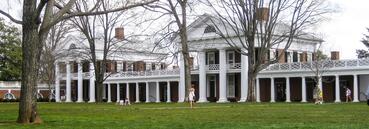
Thomas Jefferson and Freedom of Conscience
- Why We “Tolerate Any Error So Long As Reason Is Left Free to Combat It”
(Fifth in the "Shining City" Series)
by Robert L. Pyles, MD
March 2024
Among the many motivations Thomas Jefferson had in founding the University of Virginia, a truly remarkable one was his wish that there should be an institution of higher learning that was not founded as part of a religion. He had been somewhat dissatisfied with his own education at the College of William and Mary because it involved quite a bit of religious dogma. Specifically, he stated that he wanted the centerpiece of his new university to be a “library” and not a “church.” To that end, he donated his own rather extensive library for the beginning of the University of Virginia.
As Thomas Jefferson put it, “This institution will be based on the illimitable freedom of the human mind. For here we are not afraid to follow truth wherever it may lead, nor to tolerate any error so long as reason is left free to combat it.” He also felt that he had a “daring vision that higher education should be completely separated from religious doctrine.”
Dissatisfied with what he considered distractions in the texts, Jefferson created his own Bible. He deleted everything in the New Testament, except for the direct quotes of Jesus Christ, which he considered the only reliable word of God. Amazingly, the “Jefferson Bible” is a best seller to this day.
Jefferson was also felt strongly about religious tolerance. He was especially proud that he was the author of the “Statutes of Religious Freedom” in the state of Virginia. This was one of the three achievements he wanted to have engraved on his tombstone.
Ironically, what seems to have happened in recent years is that the culture of the “New World Order” , and the “Progressive Left” has taken over, not only the tours at the University of Virginia, Monticello, Montpelier, and Williamsburg, but also at many colleges and universities around the country. This movement has all of the aspects of a religion in itself, in that there is no actual rational basis for many of the beliefs and assumptions. Consequently, Jefferson might find it ironic that his attempt to keep the University of Virginia free of religious influence has now come under some duress, and his own character and reputation are being victimized by that movement.
__________________________
Among other credits, Dr. Pyles served as President of the American Psychoanalytic Association and was awarded the honor of “Distinguished Life Fellow” of the American Psychiatric Association.
- Why We “Tolerate Any Error So Long As Reason Is Left Free to Combat It”
(Fifth in the "Shining City" Series)
by Robert L. Pyles, MD
March 2024
Among the many motivations Thomas Jefferson had in founding the University of Virginia, a truly remarkable one was his wish that there should be an institution of higher learning that was not founded as part of a religion. He had been somewhat dissatisfied with his own education at the College of William and Mary because it involved quite a bit of religious dogma. Specifically, he stated that he wanted the centerpiece of his new university to be a “library” and not a “church.” To that end, he donated his own rather extensive library for the beginning of the University of Virginia.
As Thomas Jefferson put it, “This institution will be based on the illimitable freedom of the human mind. For here we are not afraid to follow truth wherever it may lead, nor to tolerate any error so long as reason is left free to combat it.” He also felt that he had a “daring vision that higher education should be completely separated from religious doctrine.”
Dissatisfied with what he considered distractions in the texts, Jefferson created his own Bible. He deleted everything in the New Testament, except for the direct quotes of Jesus Christ, which he considered the only reliable word of God. Amazingly, the “Jefferson Bible” is a best seller to this day.
Jefferson was also felt strongly about religious tolerance. He was especially proud that he was the author of the “Statutes of Religious Freedom” in the state of Virginia. This was one of the three achievements he wanted to have engraved on his tombstone.
Ironically, what seems to have happened in recent years is that the culture of the “New World Order” , and the “Progressive Left” has taken over, not only the tours at the University of Virginia, Monticello, Montpelier, and Williamsburg, but also at many colleges and universities around the country. This movement has all of the aspects of a religion in itself, in that there is no actual rational basis for many of the beliefs and assumptions. Consequently, Jefferson might find it ironic that his attempt to keep the University of Virginia free of religious influence has now come under some duress, and his own character and reputation are being victimized by that movement.
__________________________
Among other credits, Dr. Pyles served as President of the American Psychoanalytic Association and was awarded the honor of “Distinguished Life Fellow” of the American Psychiatric Association.
